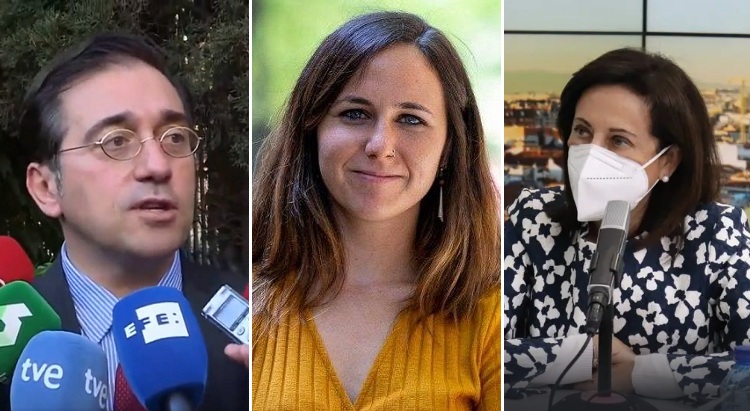The Diplomat
Both the Minister of Foreign Affairs, José Manuel Albares, and the Minister of Defense, Margarita Robles, responded yesterday to the proposals of the Minister of Social Rights and Agenda 2030 (and Secretary General of Unidas Podemos), Ione Belarra, assuring that the Government’s position on the Ukraine crisis is “clear” and is based on the defense of “dialogue and diplomacy”.
In a letter sent to the Minister of Foreign Affairs, Ione Belarra has proposed a 16-point “Peace Agenda” for Ukraine that includes the mutual withdrawal of troops deployed in the area, avoiding “the construction of an image of mutual enmity” between the European Union and Russia and putting an end to support for NATO enlargement to the east, one of the main demands of Russian President Vladimir Putin.
“Dialogue and diplomacy remain the way forward,” Albares told the press yesterday shortly before appearing before the Senate Committee on Ibero-American Affairs. For this reason, he continued, the Government’s wish is that Russia can expose its differences and doubts about NATO’s role in Europe “at the dialogue table”, whether in the UN Security Council, the OSCE, the Russia-NATO Council or “in any other diplomatic forum”. In any case, he insisted, in the event of Russian aggression against Ukraine, “the sanctions will be massive and will do enormous damage to the Russian economy.”
Regarding Belarra’s proposals, the Minister assured that he himself is willing to talk to her and the other members of the Executive “as many times as necessary”, but “the important thing is that the Government’s position is clear”, has “broad parliamentary support and broad social consensus” and coincides with that of the EU and NATO.
For her part, Margarita Robles declared on the program Más de Uno, of Onda Cero, that “absolutely never” has the possibility of sending Spanish troops to Ukraine been raised. “NATO has an article five by which, when there is an aggression against one of the allied countries, all the others have to respond, but, in this case, Ukraine is not a country that belongs to the Alliance,” she continued. “There has been too much dramatization because it is not known what Spain’s participation in NATO has been for many, many years,” she added.
The current Spanish missions in Eastern Europe “were all absolutely foreseen and are those that Spain has as a NATO member, as a serious and reliable ally,” the minister assured. “For many years, Spain has participated in the permanent naval groups in the Mediterranean and it is in this sense that the ship Meteoro, the frigate Blas de Lezo and the minehunter Sella, and for many years it has also participated in the Baltic Air Police,” she recalled. “They are permanent missions, in no case offensive, but of deterrence and, above all, of stability and preservation of peace”, she added.
In relation to Belarra’s proposals, Robles reiterated, in the same usual line as Albares, that “in the areas of foreign policy and defense, the only one who sets the guidelines established by law is the president of the Government” because “not everyone can know about everything.” “Each one will have to know the statements he makes, but of course in Spain we are all for ‘no to war’,” she warned. “It is a very complicated and very difficult moment that we are living, but I believe that a whole mechanism of dialogue and diplomacy has been set in motion, which is also essential and I am convinced that it will go ahead,” she concluded.
The main representative of Unidas Podemos in the Government, the Second Vice-President and Minister of Labor and Social Economy, Yolanda Díaz, recently acknowledged that, in the Ukraine crisis, “the voice of the Government is that of Pedro Sánchez”.







